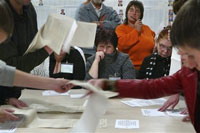Registration deadline for voters of January 29 primaries falls on Monday
Jan. 29 is one of the most important days in the political life of America. It’s the day of primaries. Campaigning for president often begins a year or more before the New Hampshire primary, almost two years before the presidential election.

For 2008, both the Republicans and the Democrats have moved their Nevada caucus to an earlier date than traditional, January 19th. In response to the Democratic Nevada Caucus being scheduled before the New Hampshire Primary, other states have also changed their primary election dates for 2008, creating a cascade of changes. The current dates up to and including Super Tuesday are now:
January 3— Iowa Caucus
January 5— Wyoming caucus
January 8— New Hampshire Primary
January 15—Michigan Primary (allowed on appeal [3])
January 19— Nevada Caucus / Republican South Carolina Primary
January 29—Democratic South Carolina Primary, Florida Primary
February 2―Maine caucus
February 5―Super Duper Tuesday: Primaries/caucuses for both parties in 19 states, plus three Democratic-only caucuses and one Republican-only primary
Everyone who wants to participate in the primaries on Jan. 29 has very little time to register.
On 31 Dec., Monday, at 5 p.m. is the deadline for registration to vote in the Democratic and Republican primaries.
It’s also the deadline to vote for the offered property tax amendment to the state constitution.
The requirements are usual:
- a person must be age 18 by election day
- a person must be a U.S. citizen. Those who haven't had their voting rights restored and people judged mentally incompetent aren't eligible.
The series of Presidential primary elections and caucuses is one of the first steps in the process of electing the President of the United States of America. A state primary election usually determines which candidates for president will be supported by that state at the national convention of each political party.
The political parties each officially nominate their candidate for President at their national convention, usually the summer before the election. Depending on state law, when voters cast ballots for a candidate in a presidential caucus or primary, they may be actually voting to award delegates "bound" to that candidate in the national convention. The rules for the awarding of delegates vary from party to party, state to state, and election to election. Not all delegates are selected by primaries and caucuses - both of the two largest parties (Democratic and Republican) have provisions for "superdelegates" chosen outside the primary system.
If no candidate wins a majority of delegates for a particular party during the primary season, that party's nominee is chosen by their convention. This method of nominee selection has not occurred since 1976, when incumbent president Gerald Ford narrowly defeated Ronald Reagan. Of course, conventions take place otherwise, but they are considered formalities.
The registration may be done at any Supervisor of Elections branch office, public library or driver's license office. One may get the needed application from the Supervisor of Elections Web site, www.browardsoe.org, and either mailed or returned in person to one of the supervisor's offices.
Subscribe to Pravda.Ru Telegram channel, Facebook, RSS!




